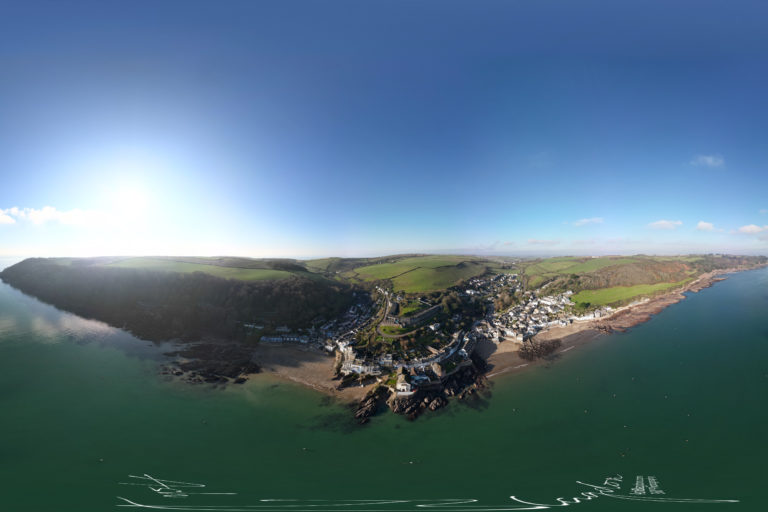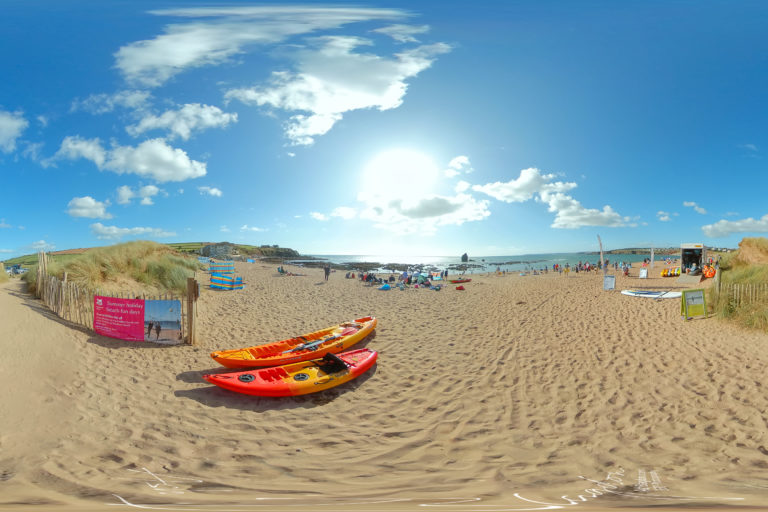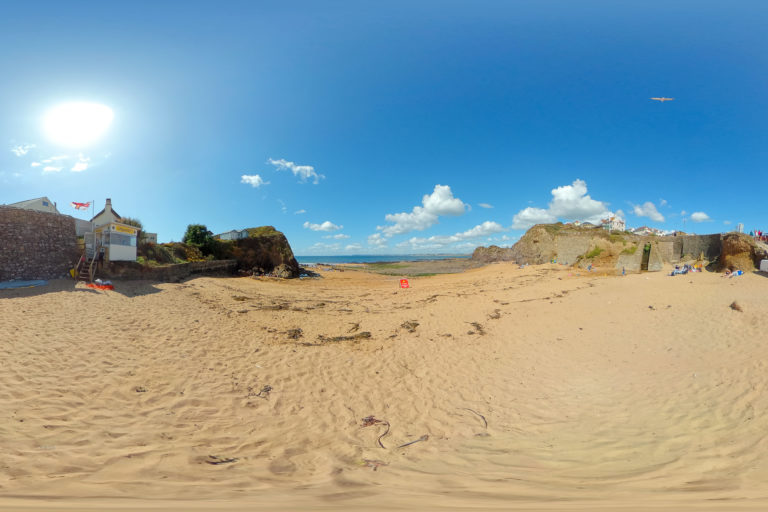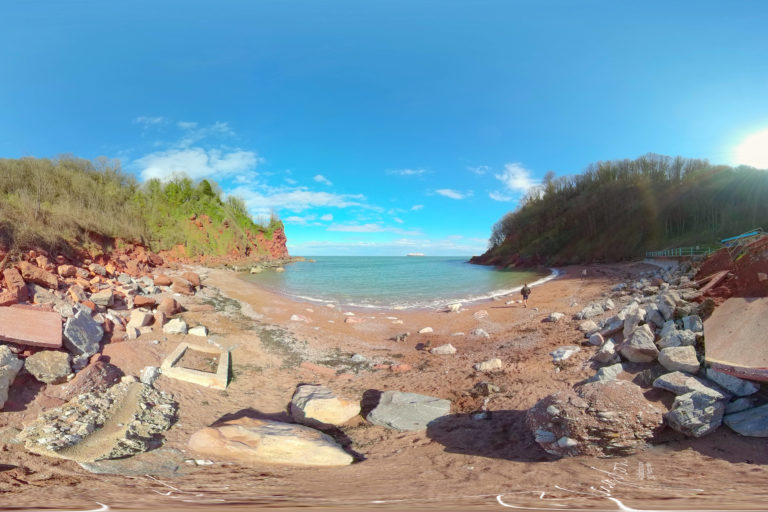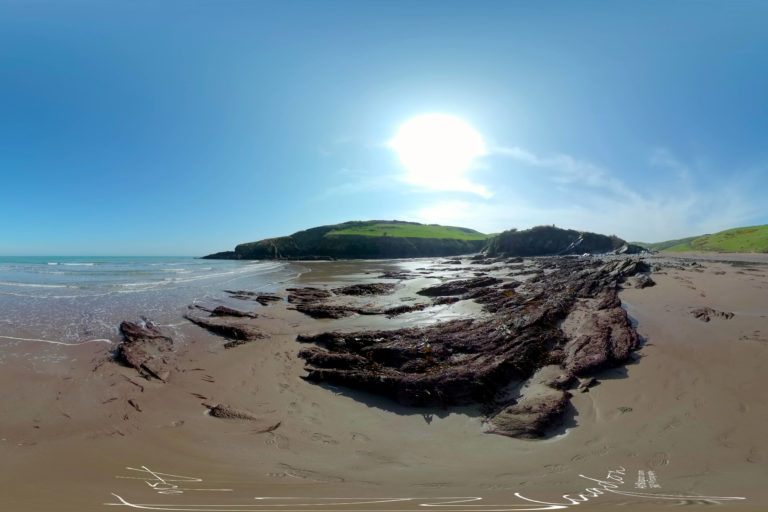Enjoy a 360 virtual tour of beaches of the UK, many with Blue Flag and Seaside Award including the famous South West Coastal Path.
- Bay – An inlet of the sea or other body of water usually smaller than a gulf.
- Beach – A shore of an ocean sea or lake or the bank of a river covered by sand or gravel or larger rock fragments.
- Bight – A bend in a coast forming an open bay.
- Channel – A narrow body of water between two portions of lands.
- Cove – A small sheltered inlet or bay.
- Estuary – Where the mouth of a fresh waterway empties into a body of salt water.
- Fjord – A narrow inlet of sea between cliffs or steep slopes.
- Gulf – A part of the ocean or sea extending into the land.
- Harbour – A part of a body of water protected and deep enough to furnish anchorage especially one with port facilities.
- Haven – A harbour or port.
- Port – A place where ships may ride secure from storms. Usually a harbour town or city where ships may take on or discharge cargo.
- Sands – A tract of sand a sandbank or sandbar.
- Sound – A long, relatively wide body of water, larger than a channel, connecting larger bodies of water.
Do’s
- Take litter home with you or put it in a bin
- Consider other people using the beach – no loud music
- Only use barbecues within the designated area
- When rock pooling please leave sea creatures where you find them. Look, but don’t touch as they may be fragile and some can sting
Don’t
- Do not bring glass onto the beach
- Do not remove stones from the beach
- Do not interfere with the lifesaving equipment – your life could depend on it
- Do not light fires
Swimming
Swimming in the sea can be fun and a great form of exercise however it does have its dangers, take a look at this advice and stay safe in the sea.
- Never swim on your own, no matter how strong a swimmer you may feel that you are.
- Always wait at least an hour after eating before you go swimming.
- Never swim after drinking alcohol; alcohol slows your reactions and can impair your ability to judge distances.
- Always swim parallel with the beach so you can easily get ashore if you have a problem. Don’t swim straight out to sea.
- Piers, breakwaters and other man-made structures can create very strong currents so avoid swimming near them.
- Don’t jump into the sea from man-made structures as you cannot tell what is under the water.
- Pay attention to any warning signs and flags on the beach. If a red flag is being displayed, do not go into the sea.
- If you are unsure about the meaning of any flags flying or signs on display, check on the information boards or with beach staff where they are present before going in the water.
Inflatables
If you want to use inflatables such as dinghies, air beds and swim rings in the sea take care and consider this safety information.
- Most inflatables, including dinghies, airbeds and swim rings will come with a warning from the manufacturer that they are unsuitable to be used in the sea.
- Never allow children to play in the sea in inflatables without adult supervision. Most inflatables have a rope attached which should be tethered or held by an adult.
- Never take inflatables into the sea when there is an offshore wind blowing. The inflatable will be blown out to sea very quickly. If the beach is manned, an orange windsock will be flown to indicate offshore winds and warning signs will be displayed.
- Pay attention to any warning signs and flags on the beach. If a red flag is being displayed, do not go into the sea.
- If you are unsure about the meaning of any flags flying or signs on display, check on the information boards or with beach staff where they are present before going in the water.
Sun safety
It’s important to protect skin in the sun to avoid sunburn and heat exhaustion. Sunburn increases the risk of skin cancer. Don’t let sunburn catch you out – whether at home or abroad. Enjoy the sun – but don’t overdo it!
For safe enjoyment of the sunshine, simply follow a few simple steps:
- Try to keep out of the sun between 11am and 3pm
- Wear sunscreen – at least factor 15 sunscreen applied generously and regularly, especially after swimming
- Wear loose cotton clothing
- Drink lots of cool drinks
- Seek shade to cool down
- Wear sunglasses and a hat
- Look out for others especially vulnerable groups such as the elderly, young children and babies and those with serious illnesses
- Never leave anyone in a closed, parked vehicle, especially infants, young children or animals
- Make sure you never burn
Child safety
Children love going to the beach, find out how you can make visits more enjoyable by staying safe.
- Supervise your child at all times.
- Use the Tag your Kids scheme, available from the Beach Manager.
- Agree a meeting point in case any member of your party gets separated from the group.
- If you become separated from your child, stay in the place where your child would expect you to be and get someone to notify the beach staff.
- Let the beach staff know as soon as you find your child.
- Ensure that they are adequately protected from the sun.
- Ensure that your child remains properly hydrated by drinking plenty of fluids.
- If the beach is not manned and your child is lost, call the Police.
- Pay attention to any warning signs and flags on the beach. If a red flag is being displayed, do not go into the sea.
- If you are unsure about the meaning of any flags flying or signs on display, check on the information boards or with beach staff where they are present before going in the water.
- After low tide, keep an eye on incoming tide to ensure you don’t get cut off.
- Wherever possible, swim at a lifeguarded beach.
- Never swim alone.
- Do not use inflatables when windy or wind is blowing offshore. On some beaches there will be an orange windsock which indicates offshore winds.
- If you see someone in difficulty, don’t attempt a rescue. Tell a lifeguard, or, if you can’t see a lifeguard, call 999 or 112 and ask for the coastguard.
- Do not dig deep holes in sand or dig tunnels in sand. They might collapse.
- Be aware of the seagulls if you’re outside with food.
- Take your rubbish home, don’t try and cram more stuff into an already overflowing beach bin.
- There are occasional reports of substances such as palm oil being washed up on beaches. Some substances are poisonous to dogs.
- If you do find something on the beach, you have to log the item with the government’s Receiver of Wreck. Then, if nobody comes forward to claim the object after a year, you can keep it.
- Download the Safer Seas app:


If you found this helpful, please like and follow my social pages
Click here to Explore the World in 360º
Originally posted on Jan 17, 2020 at 19:16
